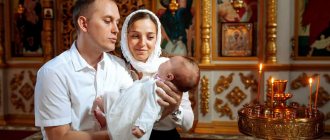The child needs help in his conscious entry into the life of the Church of Christ. We learn to believe, hope and love throughout our life's journey. It is very important to instill in a young Christian a love of prayer, Holy Scripture, church rules and worship, since this is precisely the foundation on which the entire edifice of Christian morality is built.
Communion of the Holy Mysteries of Christ is an incomprehensible action of God's love, without which spiritual life is impossible.
The key to a reverent attitude towards this Sacrament is the family atmosphere in which preparations for its reception are made.
What prayers to read before confession and communion
"Save me, God!".
Thank you for visiting our website, before you start studying the information, we ask you to subscribe to our VKontakte group Prayers for every day. Also visit our page on Odnoklassniki and subscribe to her Prayers for every day Odnoklassniki. "God bless you!". Many people do not know what to do before confession and communion, so they very often look ridiculous because they may do something wrong, or say the wrong thing, or without consulting with a knowledgeable person, they ask for help from inexperienced people. There are such concepts as the Sacrament of Confession and the Sacrament of Communion, and therefore you need to prepare for the necessary procedures the day before so that everything goes correctly and as you planned. In addition, there are special prayers that are read before confession and communion.
Sacrament of Confession
Confession is repentance - one of the seven Orthodox Christian sacraments, during which the one who confesses repents of all his sins before the minister of the church and thus receives forgiveness of all sins.
Church ministers call confession a second baptism. During baptism, a child is cleansed of original sin, and during confession, a person is cleansed of sins he has already committed during his life’s journey. For confession to take place, you need to:
- - understand and realize your sins;
- - repent of your sins;
- - the desire to leave the sin and not repeat it again;
- - faith in Jesus and hope in his mercy;
- - the belief that the Sacrament of Confession will wash away all sins.
How to prepare before confession
How do you still prepare for confession? What prayers should be read before confession? Of course, the necessary procedures
must be done on the eve before going to church. First of all, you need to prepare mentally, tune in spiritually, and know that you are ready for this hike. You also need to read the relevant literature about the Sacrament of Confession, various canons about sins, write your own on a piece of paper in order to clearly understand where you sinned and for what you want to ask for forgiveness. The preparation can be lengthy, but the main thing is that you do it consciously! In addition, you need to read what Orthodox prayers are needed before communion and confession. You can also give a piece of paper with your sins to the priest, who will read them, or you can tell yourself out loud about the sins you have committed, but you should not make a long story out of it, just briefly and clearly state your problem. According to Orthodox canons, justifying oneself is under no circumstances allowed - this is a new sin, because repentance is awareness of sins.
A very good habit is self-analysis every day and at the end repentance to yourself, so every evening you will analyze where you sinned and who you need to ask for forgiveness from. It’s also very useful to read the Penitential Canon for yourself. Then preparing for confession will not take much time, since it will be easy for you to assess what you are guilty of and what you want to repent of.
What prayers to read before confession
One of the prayers read before confession and communion:
Prayer of Simeon the New Theologian
God and Lord of all, who has the power of every breath and soul, is the only one who can heal me! Hear the prayer of me, the accursed one, and the serpent nesting in me, consume by the influx of the All-Holy and Life-Giving Spirit. And grant me, poor and naked, all virtues, to fall at the feet of my holy (spiritual) father with tears, and draw his holy soul to mercy, to have mercy on me. And grant, Lord, in my heart humility and good thoughts, befitting a sinner who has agreed to repent to You; and may not completely abandon the one soul that united with You and confessed You, and instead of the world chose and preferred You. Be aware, Lord, that I want to be saved, even if my evil custom is an obstacle: but what is possible for You, O Lord, is all that is possible; what is impossible is from man. Amen.
Sacrament of Communion
It is believed that the bread and wine that all parishioners partake of in God's temple are the blood and body of Christ. Thus,
a person can touch that intimate, sacred thing that is incomprehensible on earth; he unites both body and spirit with the Lord God himself.
The Sacrament of Communion in itself is great, therefore it requires the necessary preparations and the Sacrament of Confession, which has its own sequence: without the Sacrament of Confession, the Sacrament of Communion will not take place.
Only children under 7 years old can receive communion without confession. Also, women should not receive communion during their menstrual cycle. And women after childbirth are allowed into church for communion only after the priest reads a special prayer over them.
How to prepare before communion
Of course, the question of what to do before confession and communion has not been fully answered, since we still have to discuss communion itself, and these are two components, one might say, of one process.
There are special Orthodox prayers before communion, as well as prayers of thanksgiving after communion. It is important to know where to use which prayer. It is worth noting that it is also important to prepare mentally for communion and you need to fast for about a week or at least 3 days. This is a kind of cleansing process that makes not only the body cleaner, but also the spirit. Retreat is a kind of fasting. You should not eat certain foods; spouses should also refrain from physical contact, visit various places of entertainment, and rejoice excessively. It is necessary to read the Canon of Repentance and prayers of thanks in the morning and evening.
What prayers to read before communion
Among the prayers before confession and communion, there are many prayers in Russian that can be read before communion and prayers of thanksgiving that are read after.
Prayer of St. John of Damascus before communion:
Master Lord Jesus Christ, Our God, merciful and humane, who alone has the power to forgive the sins of people, despise (forget), forgive all my sins, conscious and unconscious, and grant me, without condemnation, to partake of Your divine, glorious, most pure and life-giving Mysteries not in punishment, not for the multiplication of sins, but for cleansing, sanctification, as a pledge of future life and kingdom, as a strong stronghold, for protection, and the defeat of enemies, for the destruction of many of my sins. For YOU are the God of mercy and generosity, and love for mankind, and we glorify You with the Father and the Holy Spirit, now and ever, and forever and ever. Amen.
Why is Children Communion necessary?
Among baptized but unchurched parents there is a widespread belief that a child should be given communion “so that he doesn’t get sick,” “for healing,” “from the evil eye,” “so that everything is fine.” This is a deep misconception. Of course, God preserves and protects his beloved children, but Communion is a great Sacrament. By receiving communion, a child unites with God and is filled with joy, which in turn leads a person to true happiness. The sacrament can be seen as medicine and vital food. But medicine and food are not only for the body, but primarily for the soul. Communion is the unity of a person with God; it is vital for the spiritual healing of a person and the salvation of the soul.
“May the Lord forgive you your sins, just do not refuse to partake of the Holy Mysteries of Christ more often - this is the great help and mercy of God.” (Reverend Ambrose of Optina).
Prayers before confession and communion
Confession and communion are among the Sacraments of the Orthodox Church. Every day in evening prayers, Christians ask the Lord for forgiveness for their sins. The culmination of repentance is forgiveness and remission of sins, that is, Confession. First you need to understand what confession is. To perform it, you need to be baptized in the Sacrament of the church and believe in the Lord Jesus Christ.
Confession as a Sacrament
Confession is cleansing from sins and second baptism. During the Sacrament of Baptism, original sin is washed away. During confession, washed with tears of repentance, liberation from sins occurs.
Sin concept
As we come to know God, we become aware of sin. At a distance from the Lord, sins do not interfere; they are not visible. When you approach God, you feel your sinfulness.
In the understanding of Orthodoxy, sins are a multifaceted phenomenon. They can be:
- the facts committed;
- thoughts, to be in a state of passions (confession of thoughts is considered a monastic lot. People who do not have serious sins and often confess can repent of their thoughts).
To begin with, it is better to confess the actual sins, that is, the ones you have committed.
Sin is contrary to the law of God. The Lord gave Moses 10 commandments, which are the foundation of Christian and human spirituality. You need to know these commandments, understand and fulfill them. We have to admit that humanity is mired in the abyss of sins.
Sins can be:
- against the Lord God;
- against one's neighbor;
- against oneself;
- mortals;
- condemning the Holy Spirit.
Sin is generated by passion, which is located in the depths of the soul. Passion itself is a sin and the potential for committing a sin through action. For example, the passion of love of money (love of wealth), when indulged in and under external circumstances, is transformed into the sin of theft. The passions found in a person’s soul are primary sins, since they induce sinful activity and fall. Demons become sources of passions. Their destruction is the basis of Orthodox asceticism (the science of “spiritual work”).
The soul must be protected for birth into the future Kingdom. Gradually, sin kills and poisons her. With a frivolous attitude towards sins, the murder of the soul occurs. It can become dead in a living body.
The sins committed are a direct insult to God, the Heavenly Father. This will be followed by punishment. Each time a person commits sins, he becomes an accomplice in the crucifixion of Jesus. Living with this understanding is unbearable. Repentance and mercy are two moments in the relationship between God and man. Confession absorbs these concepts into a single grace-filled action.
Sin is dirt, and confession is the washing of the soul, which heals its sick and poisoned soul. In Orthodoxy this happens in the Holy Church. To receive forgiveness of sins, you need to accept the gift of God: the Sacrament of Confession.
To do this you need:
- Trust in God;
- try to fulfill His commandments;
- lament your sins;
- repent;
- try not to repeat sins.
Only in this case can you count on the mercy of the Lord.
Preparing for Confession
What prayers are read before confession:
- morning and evening prayer rules, which must be read in full;
- penitential canon;
- prayer of Simeon the New Theologian.
There is no special preparation for confession. It can happen wherever there is an Orthodox clergyman. He is a prayer book, a petitioner for us before God and a witness that the Sacrament takes place in a legal manner. Confession does not require special fasting and prayer, but only faith and repentance.
Before preparing for confession, you need to take an appraising look at your soul. Analyze life from the point of view of the commandments. If necessary, write down any sins on a piece of paper so as not to miss anything. Pray for the granting of true repentance and come to church for the Sacrament.
You can use Orthodox literature to help compile sins. Over time, you need to learn to confess “from yourself,” and not from books. Sins are recognized by the grace of God. If you experience sins without faith, you can fall into despondency, not repent and get sick. It is necessary not to learn sins from a book, but from striving for God.
It is generally accepted to confess in church during a service or at another time designated by the priest. If it is impossible to visit church, if a person is sick, confession at home is possible. At first, a Christian believer cannot confess all sins, but starts with small and insignificant ones. Then the sinner releases grave sins from himself. The believer himself must mature for this.
Confession is performed at different times:
- at the evening service;
- in the morning before the liturgy;
- during the liturgy, before communion.
Confession takes place in front of the lectern in the chapels, on the salt or in the vestibule. Parishioners line up so as not to disturb the one who is repenting.
When approaching the priest, you need to bow your head or kneel. Kneeling is canceled from Easter to Trinity, on Sundays and great holidays. The priest covers the sinner's head with an epitrachelion, prays, finds out the name of the penitent and what he wants to confess before God. The confessor must repent of passions, weaknesses and name specific sins. In some cases, for example, due to the illness of a penitent, the priest himself can read his sins from the sheet and forgive them.
After the confession, the priest asks questions, gives instructions, or imposes penance (special obedience). Then he prays for the forgiveness of sins and reads the “permissive” prayer. It is a seal confirming the accomplishment of the Sacrament.
After this, the forgiven sinner is baptized, kisses the cross and the Gospel, then asks for a blessing for communion.
If you need advice from a confessor, then you need to come at a different time. At confession they talk only about sins, without justifying themselves, without condemning others, and ask for forgiveness for sins. There is no need to list all cases of sin specifically; it is better to do it generally. Before the Sacrament, you need to reconcile with the offenders; if this is physically impossible to do, then reconcile in your heart.
Sometimes, for some reason, confession is short. After the priest asks: “Do you repent of your sins?”, answer: “I repent.” After this, the “permissive” prayer is immediately read. There is no need to be embarrassed by such a confession, because it is complete. You can ask the priest to listen to the entire confession in cases where there is a sin that weighs on the soul.
There is no need to be embarrassed by your sinfulness, since there are no unforgiven sins except those that have not been confessed. Among the saints there are people who were previously sinners. For their ardent faith and sincere repentance, they received forgiveness and holiness. The first person to enter heaven was a repentant thief.
Do not be ashamed of the priest, he is not a holy man. He, convicted with glory and power in the Sacrament of the Priesthood, that is, strong in Christ. By nature he is weak and sinful, like any person. He himself, being experienced, can help those who are experienced.
The Lord is tempted in everything except sin. He was beaten, betrayed, humiliated. The apostles had the experience of sin. They said: “Christ came into the world to save sinners, and I am the first of them.” The priest becomes a witness of human repentance, brings the repentant and the Lord together. The sinner confesses to God through a priest. Even vile sins do not cause him to have a bad attitude towards the penitent. A purified soul awakens positive emotions, love and joy. The priest keeps the secret of confession.
Unfortunately, sometimes people confess all their lives, but never repent. The believer himself decides how many times and how often to confess. The measure of love for God determines this frequency. There are no generally accepted standards; each case is individual. At the beginning of churching, believers rarely come to confession, but then the soul will want this and burn with the desire to confess.
It is better to come to confession every Lent (4 times a year), once a month, and then every Sunday. But all this is determined by the priest; he must understand who is in front of him and not give too much load at once.
General confession is needed only for those who want and need it. To do this, you need to find a priest who will help you go through it. At such a confession, a detailed analysis of all sins takes place. This is a long procedure and is most often practiced in monasticism.
During general confession, the priest does not listen to every penitent. Such confession takes place in parishes where it has been justified and has been blessed. Usually Orthodox-educated parishioners are present there, who often confess and receive communion. Beginners should not attend such confessions.
Previously, public confessions were held, but there were few Christians then. There were persecutions against the Church of Christ, and people atoned for their sinfulness with blood, so they did not have many sins, only everyday ones. The church has increased in number and therefore there is a practice of listening to everyone in secret.
During Communion, the grace of the Holy Spirit descends on bread and wine, this is the Body and Blood of Christ. A person can accept these gifts only by his own free will. The Lord gives Himself to everyone, and only true believers receive Him.
Believers often consider themselves unworthy of Communion. They forget that it exists for the unworthy. An Orthodox Christian should strive to receive communion regularly, because it is food for the soul.
Preparation for Communion
The goal is not to complete formalities, but to achieve a repentant state of soul. You need to prepare to participate in the Eucharist.
- realize and respect the Sacrament;
- sincerely believe in the Lord;
- understand the meaning of the Sacrament;
- experience sacred awe before the Savior’s Sacrifice;
- understand the unworthiness of accepting the Gift (accept it as the mercy of the Lord, and not as a reward);
- forgive sincerely in the heart all offenders;
- reconcile with offenders;
- start fasting before Communion (fasting), adhere to bodily fasting, do not eat fast food: meat, milk, eggs, and fish during strict fasting. Usually they fast for three days, but there are exceptions. The duration of fasting is discussed with the priest individually. The same rule applies differently to everyone. If a believer fasts during all Lents, Wednesday and Friday, he may be allowed not to fast before communion. Especially if there is no fasting during the communion period. Pregnant women, infirm and sick people abstain from fasting. They can fast according to their own strength;
- adhere to spiritual abstinence: do not visit places of entertainment, do not have marital intimacy;
- lead a pious lifestyle, give alms;
- read certain prayers established by the Church, which are in the prayer book (the exact volume of prayers is discussed with the priest).
What prayers are read before communion:
- morning and evening prayer rules (on Bright Week they are replaced by the reading of the Easter Canon).
- Canons. One per day, starting three days before communion. It is necessary to read the canon of repentance to our Lord Jesus Christ, the canon of prayer to the Most Holy Theotokos and the Guardian Angel. To reduce the volume, the canons are connected (how to do this is indicated in the prayer book).
- Akathist to Our Sweetest Lord Jesus Christ.
- Follow-up to Holy Communion is read in the evening, on the eve of the day of the Sacrament, before the evening prayers.
There are exceptions, for example, for eye disease or physical infirmity. They replace the reading of canons and akathists with the Jesus Prayer and bows, everything is discussed in advance with the confessor.
Before Communion, you should go to the evening service the day before. If there is a confession, then confess. You can make confession in the morning before the liturgy before Communion. In cathedrals and monasteries, liturgies are served daily, and in parish churches on Sundays and holidays. In some cases, the confessor allows a parishioner to receive communion without prior confession.
The sacrament of the Eucharist is celebrated on an empty stomach. In the morning you need to brush your teeth, but you can’t smoke. During the liturgy, it is necessary to prayerfully participate in the service. When the priest comes out of the altar with the cup and proclaims: “Draw near with the fear of God and in faith,” the communicants line up in front of the pulpit, one after another, on the right side of the temple. First, the altar servers and monks receive communion, then the children, then the infirm, then the men, and finally the women. You need to bow to the ground in advance and fold your arms crosswise.
You cannot cross yourself in front of the cup, so as not to accidentally knock it over. When it’s your turn, stand in front of the priest, say your full baptismal name and open your mouth to receive a spoon containing a particle of the Body and Blood of Christ. Lick the liar after the lips are wet with the cloth and kiss the edge of the cup (represents the rib of Christ). Do not touch the cup with your hands and do not kiss the hand of the clergyman. Then go to the table and wash your mouth. In order not to expel particles of the Gifts from oneself, drink a “zapivka” (diluted wine with holy water) and take a particle of prosphora.
Women wipe off their lipstick before communion. You cannot receive communion during a period of female “uncleanness.” After childbirth, they are allowed to receive Communion only with a special prayer from the priest. The Church does not insist on weddings and recognizes registered marriages. Therefore, people who live in a civil marriage (live in the sin of fornication) are not allowed to take communion.
How often to celebrate Communion is decided by the person himself, in consultation with his confessor. Frequent communion can become a habit. Then the believers again cultivate a thirst for the Eucharist and abstain from it for a period. According to the clergy, one must confess and receive communion during Lent or after committing a grave sin, when peace is lost in the soul. Once a year you must come to Communion.
The sick, infirm and dying are given communion at home with spare holy gifts. They are prepared on Maundy Thursday. They are located in the tabernacle in the altar. The patient must be conscious and clear-minded. They discuss with the priest in advance how to prepare the suffering person. At home you need to prepare a table with a clean tablecloth, an icon, boiled water and a teaspoon. Prayers of gratitude are read aloud to the sick person. Often, after communion, the sick and infirm recover, because communion sanctifies the physical and spiritual nature.
After Communion
It is imperative to wait until the end of the liturgy and kiss the cross at the end. Listen to Prayers of Thanksgiving for Holy Communion in church or read them at home. The whole day is spent in piety. On the day of communion, prostrations are not performed, with the exception of Holy Saturday and Trinity.
Child at confession and communion
Childhood is paradise; after committing the first sin, the child leaves it. Children under seven years of age, who are considered infants in the Orthodox Church, receive communion without confession. Every trip to church should bring joy to the child, and not be a chore.
Preparing the child
It is necessary to gradually introduce the child to Orthodoxy. Systematically read prayers with your child, learn the prayer to the Guardian Angel. Children do not fast before communion. But it is useful to read soul-saving books with your child: the Gospel, the lives of the saints.
For the baby's communion, you must come directly to the Sacrament and so that the child attends the liturgy. If children are properly taught to attend church services, then at the age of 7 they can endure the entire service.
A child may behave restlessly at the Chalice, this is due to the rare reception of the Sacrament. Infants are brought horizontally to the Chalice, the head is held on the right hand. The child's hands are held so that he does not push the Cup. Before communion, the child is not fed tightly. Infants receive communion only with the blood of Christ. When a child behaves calmly and receives communion often, he may be given a small particle.
Due to lack of faith, some parents do not allow their child to receive communion. Explaining that from the spoon, which is the same for everyone during communion, you can become infected. This is a lack of faith in the power of the Eucharist.
From the age of seven, the child begins to take the Chalice, having previously confessed. You need to carefully prepare for your first confession. You can find a priest with many children who will understand the child better. It will be easier for the child to make confession with his father-grandfather, who has extensive life experience.
Parents need to tell their child in advance about the Sacraments of Confession and Communion. Tell about sins and say that after confession you should not sin again. There is no need to write sins on a piece of paper for your child or name the sins yourself. The child must think for himself and sum up his actions.
The family is a small church, and parents serve as examples of Christian life. They and their godparents must sanctify the child.
The desire to confess and receive communion is a good sign. The main thing is to approach this responsibly and with spiritual trepidation, “not to court or condemnation.”
Preparing children for communion
But children’s preparation for communion is special, individual.
As you know, you need to prepare for Communion and Confession, but children’s preparation and children’s confession are completely special, incomparable to adults. The task of a Christian, including a young Christian, is to benefit from Confession and Communion, therefore it is important that the preparation for the sacrament and the confession itself are effective and not overloaded. If the priest is experienced, this issue can be discussed individually; if the priest requires reading all the canons, strict fasting for the child, then the big question is whether this is useful. At this stage, in my opinion, an individual approach is important, if a child in the Temple from infancy is one thing, if from time to time it is another.
You need to talk to the child and explain, and not command and drag him by force.
It is important in advance, even before preparation, to explain to the child in simple language why he now needs to prepare for communion. And in fact, every parent should have a timely conversation with their child that when he turns 7 years old, his childhood is over, that adulthood has begun and all the sins and bad deeds of God and his Angels are taken into account and recorded on him. And in order to be cleansed of sins, he must independently confess and receive communion. What is supposed to be repented of at Confession, the child also needs and can be explained in advance, because you know all the bad deeds and inclinations of your child very well. There is no need for parents to write a note to their child or force him to stand over his soul until he writes this note. Leave the child his individual Confession and do not ask him about what he confessed or what the priest asked about. If the child wants, he will tell himself, if not, then no.
Alternatively, the preparation may be as follows, but it is important to discuss individually with the parish priest
Regarding all questions regarding fasting, I will note that, in my opinion, it would be correct to give up sweets for the first two days, give up meat on the second day, but leave the opportunity to eat fish and dairy, and on the third day give up fish and dairy. If the child is still small, then for the third day we refuse fish and leave dairy in the diet. By and large, this is all individual and discussed with a specific confessor. Therefore, my reasoning in this case is more of a reasoning than a recipe.
The spiritual preparation of a child is also important
It is important, in addition to physical preparation, to prepare the child for the sacrament spiritually, by reading prayers more often, reading the children's Bible, watching cartoons less, and for example, replacing them with watching the Law of God, it is in our gallery.
Everything is gradual, and so are prayers.
Regarding all the points regarding prayer preparation, I will emphasize: the child needs to be accustomed to evening services, but if it is still difficult, you can first skip it, then come halfway, then stand completely. On the evening before Communion, just like adults, children do not need to watch cartoons, but need to read books about God and his Saints.
Next it is time for the question of prayers. I am convinced that a child should be introduced into prayer gradually. First, I think, it is permissible to read three prayers from the evening prayers, then after the “Canon to the Guardian Angel” read one prayer, after the “Canon to the Mother of God” read one prayer, after the “Canon to the Savior” read 1 prayer and then read 4 prayers from the “Canon to Holy Communion." I think this will be enough, but it is important to read them clearly, with attention, praying from the heart, but without developing a formal attitude to the matter of prayer. Gradually, the number of prayers needs to be increased. Look at the link to the prayer book published by the Moscow Patriarchate, everything is prepared there for children’s prayer.
This material is collected from the Patristic literature, which is freely available on the Internet, both separately (in excerpts) and in entire electronic books, the volumes of which are very large for the modern reader, who, as a rule, is accustomed to grasping only the superficial essence. The author of this project has systematized and selected the material as much as possible, highlighting the most important things, focusing on his point of view.
The creator of this project does not claim authorship of the presented materials and strongly recommends that interested readers purchase the full versions of the Patristic works in printed form. The sources used are listed in a special section of our website “Recommended Literature and Sources”; in addition, we accompanied each book with a short review, useful for all concerned readers.
“Should a child fast before communion?”
– Again: if fasting is a burden for parents, then a problem arises with the child. And if this is the natural life of a family, then such questions do not even arise. The child eats what adults give him. Fasting is not a hunger strike. This is a change in your habits and lifestyle. The main thing in our life is not the number of prayers, not fasting - all this is just a means.
It is necessary not to prohibit, not to force, but for the child to voluntarily accept such a lifestyle. If he was forced, he will break out from under his parent’s wing and still do it his own way, that’s what’s terrible. The Holy Fathers advise raising a child in such a way that when he grows up, when at the age of 7 he goes to confession for the first time, he feels himself a Christian, so that he takes the yoke of Christ voluntarily.
It is impossible to force someone to do this. The beauty of such a life can only be shown. And when children become interested in spiritual life, they discover a wealth that is incomparable with all the riches of the world. As in the Gospel: I found a pearl, went and sold everything for it. So it is with spiritual life: if you find it, you will give up everything in order to live this life. We need to help the child discover this wealth within himself, so that he does not think that it is all just external.
“If a child receives communion without confession, should he already somehow prepare for communion?”
“There are no special rules, but if it is possible for him not to eat before communion, that will be good.” It is necessary to teach a child so that from an early age he prepares for going to church, gets ready.
“When a child is preparing for his first confession, you need to tell him what sins he has and how to repent of them?”
“We are used to drawing children’s attention to what they are doing badly. But the main problem is not that they do bad things, but that they do not try to do good things. The greatest sin is that a person does not do what he should do. He is scolded, and the man realized that he is bad. But the sin is that he does not become good. The main sinfulness is non-conformity to the ideal, holiness.
What is repentance? This is a change in life towards the ideal, holiness. I have to correct myself. If I only have a vision of deviation, and not movement towards the ideal, this is the worst thing. You need to see the goal of Christian life - pleasing God. How did I not please God? I should have pleased him, but I didn’t? Didn't do it, didn't do it. Our very sins are not in doing, but in not doing. Didn't fulfill his responsibilities as a child. Which? Obedience to parents, help, humility, your responsibilities as a student. When an adult comes and says that he has no particular sins, then this is evidence of his lack of understanding of the purpose of his life.
“Do parents have to somehow guide, suggest, or does the child decide for himself what to say to the priest?”
“Even before the age of seven, he must be prepared that the day will come when he will come to confession for the first time.” This is a holiday! This is the child's first meeting with a priest at confession. The parents hand the child from their hands to him. The priest also needs to be prepared for this. Godly parents warn me in advance.
I already know that the child came for the first time and I need to talk to him. Here there is another conversation - a conversation with a confessor, the spiritual care of the child begins. It’s not just that parents formally bring their child to church, but they need to bring him to the priest who will continue to care for him in the future.
“Can I ask the child what the priest told him?”
– The secret of confession lies not only in the fact that the priest cannot talk about what he heard during confession, but the one who confessed must also keep it. Idle curiosity about the mystery of spiritual life is sinful. Therefore, parents must teach themselves to humble themselves and not ask such questions.
“What if the child himself wants to tell, because he is used to sharing everything with his parents?”
“Then be silent and listen.” Then consult with the priest. But don’t incite this conversation, don’t encourage it. Still, conversation on confessional topics should only happen in confession. And the child must also be able to preserve his inner peace.
How to prepare a child for Communion
In Orthodoxy, a child under 7 years of age is considered an infant. The rules for Communion of infants have been significantly simplified. Very young children under 3 years of age can be brought directly to Communion, gradually increasing the time spent at the service. It is important that the child gets used to church singing and being in the temple of God, and is not afraid to begin the sacraments. The child may cry the first time before Communion. There's nothing wrong with that. The main thing is to participate with your child in the Sacrament as often as possible (preferably on Sundays). It’s even better if the parents take communion with the baby; for the baby this is the best example of the parents’ faith.
How to give Holy Communion to a child under 3 years old? Children of this age do not need to fast before communion and come to the service on an empty stomach. Directly in the temple, it is best for one of the parents to take the child in his arms and bring him to the Chalice, saying the name of the baby given at baptism. In most churches there is such a tradition as Communion of children out of turn.
Can a child eat before Communion? After 3 years, the child should be gradually accustomed to fasting and abstaining from food before Communion, and the meaning of participation in the sacraments and divine services should be explained to him. Communion for children under 7 years of age is carried out without confession and prayer rules, unless one has been established by the priest.










